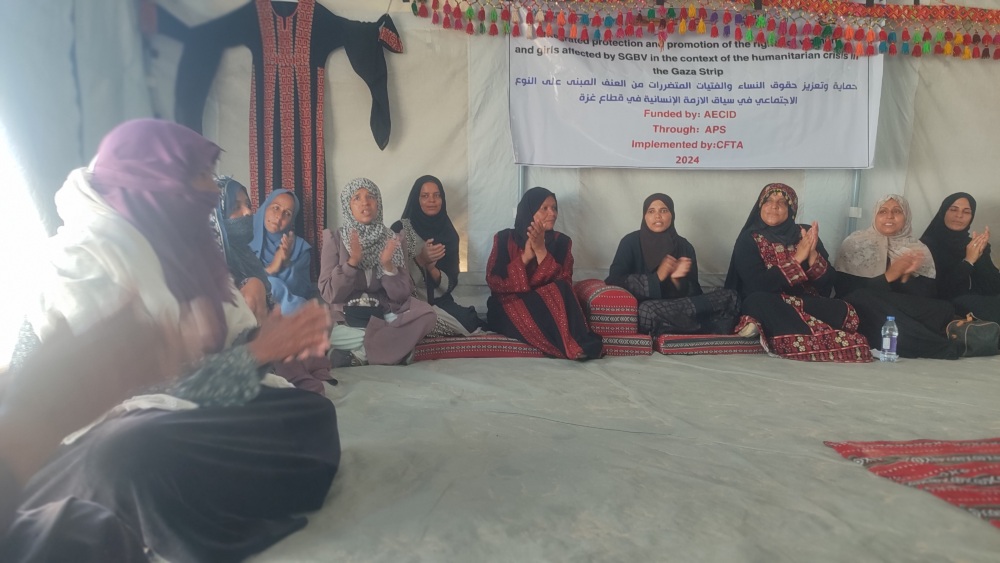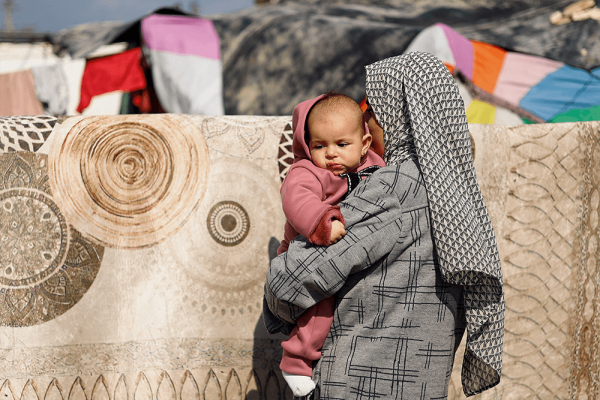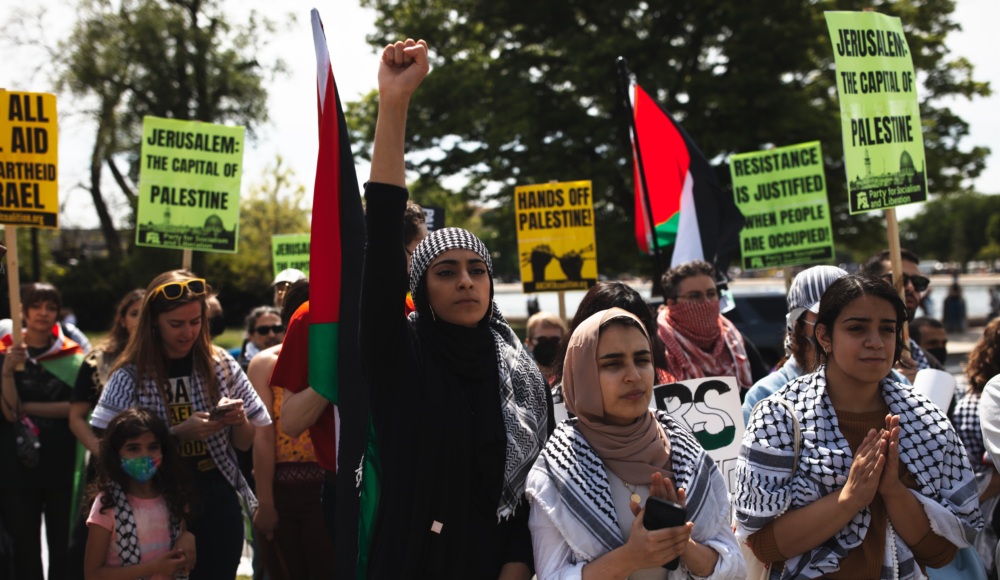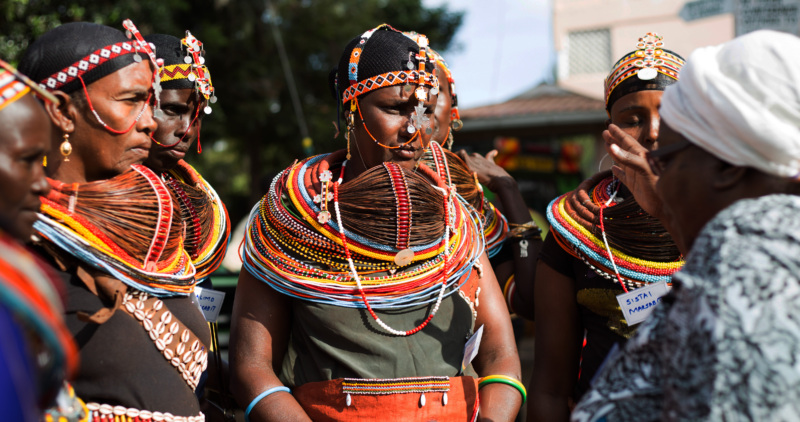
A Year of Holding Hope through Grief
View Details
Gaza is the Most Dangerous Place in the World to Give Birth
View Details
MADRE Denounces Cuts in Aid to Palestine
View DetailsOctober 29, 2021
October 29, 2021
The military coup in Sudan is a terrible setback to the powerful work for democracy that women have led. We spoke to one of our partners in Sudan, about what’s happening now and what it means. Our partner must remain anonymous for security reasons.
What do you see coming next?
The people of Sudan refuse this move from the army, and we are all preparing for a big demonstration all over Sudan on Saturday to demand the return of the civilian government and the release of all the detainees.
Even a few days ago, on October 21, we organized another big demonstration in support to the Prime Minister and his government. Millions of the people of Sudan in 50 cities and localities went to the street, demanding that the army stay away because there were reports the army was going to stage a coup.
What are the prospects for preserving or advancing democracy in Sudan?
This is a really difficult question, and it depends on the army separating itself completely from politics in Sudan. If there is any hope to restore the transitional government, it has to be through a very clear agreement that the army should keep away from governance and political issues. That way, the civil government can take the people to the election, which was supposed to be in the beginning of 2024. This is the only way.
We also must pay attention to the negative impact of regional governments like Egypt, the Emirates, and Saudi Arabia. Those are working hard to block every attempt of the Sudanese people to have democracy, for many reasons. One is that they don’t want democracy in the region, considering their own dictatorships and authoritarian regimes. The other has to do with the resources we have in Sudan, like livestock, gold and other minerals, much of which goes to Egypt, the Emirates and others. They also have an interest in the ports of Sudan. There are many ways that these powers want to benefit from Sudan, which is a big problem. We want the world to speak out and stop these regional countries from getting in the business of Sudan.
What does this crisis mean for women’s rights?
If this government becomes a reality, this is really a big setback for the women and girls. Because the leaders of this coup, they don’t like the freedoms that women and girls have enjoyed. Now they are retaliating with brutality against the women and youth who are leading demonstrations.
October 26, 2021
MADRE condemns the military coup in Sudan, a blow to the vision of democracy for which people there have struggled and mobilized. In 2019, the people of Sudan made history by ousting an authoritarian ruler who had held power for three decades — and we must always remember that young women propelled that change.
Even in those early days of transition, feminist pro-democracy organizers knew the work was not done. The Sudanese military has remained an obstacle, its leadership resisting efforts to remove its control over the economy and policymaking. Just last week, thousands of people took to the streets to demand an end to military rule and a move to a civilian government.
Our grassroots partners are Sudanese women who have devoted years to defending rights, organizing communities, and seeding democracy. They had already begun making vital contributions to the drafting of a new constitution, engaging rural, often-excluded communities in the process and pushing for the inclusion of women’s rights.
In Sudan, as around the world, feminist organizing is indispensable to democracy. We stand in solidarity with our partners in Sudan through this difficult time and as they continue to press for rights and justice.
April 11, 2019
The people of Sudan rose up because they had a vision of their country’s future — one of peace, freedom and justice. And youth, and especially young women, have been the leading force driving the four-month protest to call for an end to the regime of Omar al-Bashir.
The more that I’ve heard from our local contacts, the more inspired I have been. I heard of protest songs honoring the legacies of Sudan’s foremothers, women who struggled as freedom fighters through the ages. I heard from older activists who had confronted dictatorships of decades past and who found renewed hope in the youth organizing surging forward today.
Today, 30 years after seizing power in a military coup, Bashir was deposed as president, by yet another military coup. This historic moment is a testament to the power of people’s organizing to build pressure to confront oppression and demand change.
Local organizers have recognized immediately that this is a turning point — but that their struggle must continue. The people of Sudan haven’t yet achieved their aims of democracy and civilian government. The new military ruler has also been linked to severe rights violations, has suspended the constitution and imposed a curfew.
Sudanese activists are determined to keep up their protests. Here’s what I heard from one of them, a message I’m sharing anonymously to protect their safety.
I have been demonstrating at the Army headquarters for the last six days, with thousands of other people of Sudan. The majority are youth.
Islamists are trying to steal the revolution, using their people in the army. We all are refusing to accept the head of the army, as he is one of the worst. We all agree to keep protesting, and we demand real change.
MADRE has long supported the work of women organizing in Sudan, to sustain healthy communities, to educate their girls and to demand their rights. Grassroots organizing like this will be the foundation of a future democratic Sudan, and now more than ever, women’s leadership is needed.
July 8, 2011
On Saturday, six months after a historic Sudanese referendum vote, South Sudan will officially break from the North to become an independent state. The secession marks the latest development in a peace process negotiated to end a brutal decades-long civil war between the north and south.
MADRE’s Sudanese partner organization, Zenab for Women in Development, worked tirelessly for months leading up to the referendum to raise public awareness about the need for a peaceful and effective voting process. They facilitated voter education workshops that encouraged women to vote, and they assisted in training election observers to monitor the polls.
As we witness the creation of a new state, MADRE joins Zenab for Women in Development to call for an end to violence and for the inclusion of women’s voices in policy-making as both countries chart their paths forward.
March 3, 2011
Today, Fatima Ahmed, the director of our sister organization in Sudan, Zenab for Women in Development , stopped by our office. She told us about Zenab’s latest work to support women farmers and to ensure peace during Sudan’s recent landmark referendum–and we want to share those stories with you.
We talked with her about the referendum in January, which resulted in a decision for South Sudan to become a separate country. The fact that the vote did not trigger a return to armed conflict is thanks in part to the mobilizing efforts of grassroots organizations–like Zenab for Women in Development.
Preparing for a Historic Vote
For months leading up to the referendum, Fatima and her colleagues concentrated on raising public awareness and encouraging a peaceful and effective voting process.
They conducted two three-day training workshops for women leaders in the states of Kassala and Gadaref. They also facilitated 10 voter education workshops in Gadaref that encouraged women to vote. Forty women were trained, with Fatima’s help, to become election observers and to monitor the polling, counting, and tabulation processes.
International election observers visited Zenab’s office and reported that they were impressed by the women representing Zenab in polling centers across the country.
Zenab’s public education work continues as the new nation of South Sudan prepares to declare its independence in July 2011.
Women Farmers Sustaining Communities
Through these tumultuous times, Fatima told us how the programs of Zenab for Women in Development continue to support women farmers and the communities that depend on them. In 2008, MADRE and Zenab for Women in Development partnered to found Sudan’s first women farmers union and to empower women farmers to access tools, seeds, credit and training opportunities usually reserved for men.
By supporting women farmers, Zenab helps increase crop production in the rural Gadaref area of Sudan, while conserving natural resources. The women are committed to farming organically and working together to promote an understanding of good nutrition and environmental preservation in their communities. And they use profits from their crops to help secure women’s human rights and people-centered development in their communities.
Through Zenab, MADRE supports over 400 women in six communities, bolstering Zenab’s work to distribute seeds, help women to pay rent on their farming land, and improve plowing and harvesting techniques.
Fatima passed along good news from the women farmers –the latest harvest was a bumper crop! As a result, women will have a boost in their income, new ways to support their families, and new opportunities to invest in their communities.
What’s more, they are approaching a new milestone. In the past few years, with support from MADRE and Zenab, the women farmers have rented land in order to plant their crops. As their crops prosper, they are thinking big and planning to buy a shared plot of land. As Fatima explained, instead of temporary renting, this land will be a secure and permanent place for them to farm.
January 7, 2011
On January 9, the people of Southern Sudan will cast their votes to determine whether the North and South of Sudan will remain unified, or whether Southern Sudan will secede and become an independent state. On this momentous day, six years after the implementation of Sudan’s Comprehensive Peace Agreement that effectively ended the civil war between Northern and Southern Sudan, we at MADRE send our strongest wishes for peace to the women and families of Sudan.
MADRE’s Sudanese partner organization, Zenab for Women in Development, has been working tirelessly for the past months, conducting widespread community education campaigns to help ensure that the referendum is peaceful and constructive. We applaud their efforts and echo their call for peace.
A Year of Holding Hope through Grief
View DetailsGaza is the Most Dangerous Place in the World to Give Birth
View DetailsMADRE Denounces Cuts in Aid to Palestine
View DetailsA Year of Holding Hope through Grief
View DetailsGaza is the Most Dangerous Place in the World to Give Birth
View DetailsMADRE Denounces Cuts in Aid to Palestine
View DetailsJoin a global movement of grassroots action
Connect with MADRE for news, events, and opportunities to build racial, gender, and climate justice with our grassroots partners all over the world.
